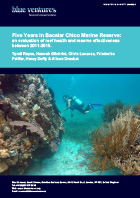Abstract
The increase in negative impacts due to unsustainable tourism practices, overfishing, marine pollution and global climate change has made coral reefs one of the world’s most threatened ecosystems. In order to improve the resilience of reefs to global changes, local stressors need to be managed. Historically, marine protected areas (MPAs) have been one of the most commonly applied tools for coral reef conservation, with variable success in restoring fisheries or benefitting reef health. Bacalar Chico Marine Reserve (BCMR) was established in northern Belize in 1996 as a small multiple-use MPA. In order to evaluate the management effectiveness of BCMR, dive surveys following the Mesoamerican Barrier Reef System Synoptic Monitoring Program (MBRS-SMP) protocol were conducted at ten sites within the reserve and two control sites outside the reserve over a five-year period (2011–15). Additional surveys were conducted on queen conch (Lobatus gigas) and Caribbean spiny lobster (Panulirus argus), both important commercial species in Belize, along with opportunistic sightings of megafauna recorded during routine activities. Results show that coral reef health in BCMR is ranked at Poor to Critical status under the Simplified Integrated Reef Health Index (SIRHI) scale. This ranking was based on several factors, including a significant decline in fish biomass between 2011–15, with Critical commercial fish biomass and herbivorous fish biomass in 2015. Although hard coral cover increased from Poor in 2011 to Fair in 2015 it was lower than the 2015 national average (15%), and fleshy macroalgae cover was higher than the 2015 national average (24%). The abundance of lobster and queen conch varied across management zones but with no significant difference between the years. Five species of ray, two species of shark and three species of marine turtle were sighted in BCMR between 2011–15; there was no significant difference per zone for elasmobranch sightings, and turtle sightings only differed significantly between reef types. There was minimal or no measurable influence of the different management zones on coral reef condition or the populations of commercial and endangered species. On the basis of these results, a reassessment of the management approach for BCMR is strongly recommended, including a review of the location of management zones, the implementation of an updated management plan, strengthening the enforcement of reserve regulations, and improving ridge-to-reef management focusing on land-based pollution within the Northern Belize Coastal Complex.

















